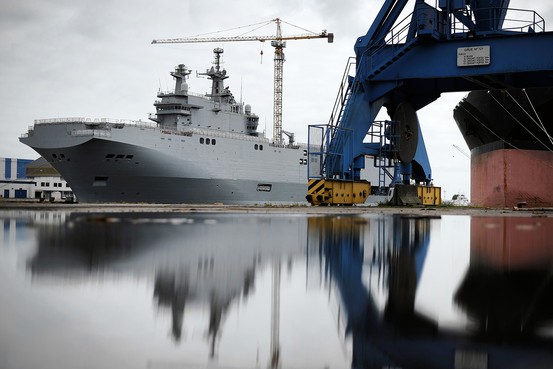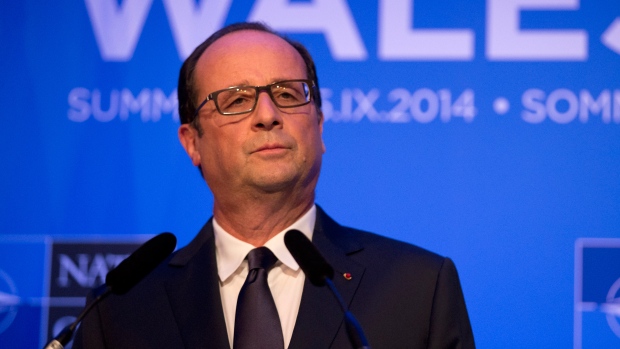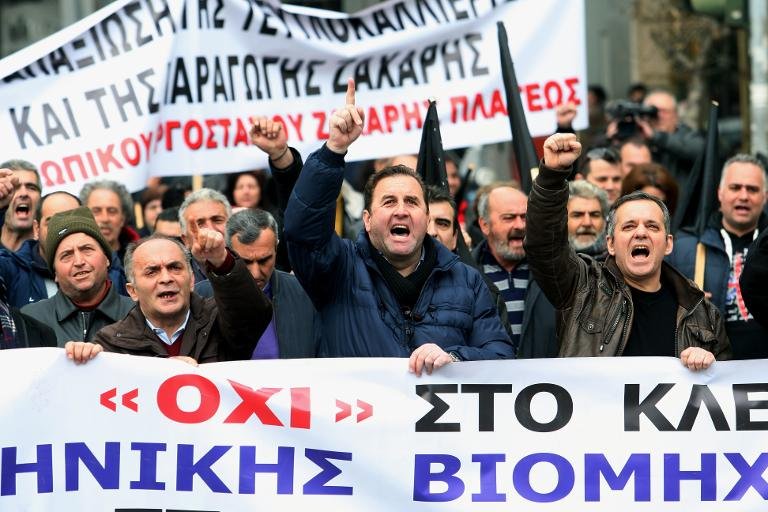After a second front was opened in the Ukrainian civil war, allegedly by Russian forces, French President François Hollande announced, after months of pressure, that France would suspend the delivery of the first Mistral amphibious assault ship to Russia.
This contract, signed in June 2011, encompassed the sale of two French-built Mistrals with two more to be built in Russia. The Mistral is a highly capable helicopter carrier that has been operated by the French Navy since 2006. It can carry at least a dozen heavy helicopters, as well as being equipped to put ashore 13 Leclerc battle tanks and around a battalion-sized infantry formation.
“In 2008, Russian Admiral Vladimir Vysotsky boasted that had the Russian Navy possessed Mistral-class ships during that summer’s war with Georgia, it could have been won in ’40 minutes instead of 26 hours'”.
In 2008, Russian Admiral Vladimir Vysotsky boasted that had the Russian Navy possessed Mistral-class ships during that summer’s war with Georgia, it could have been won in “40 minutes instead of 26 hours”. Russia’s capability to control coastal areas has been limited in the past, and the acquisition of the Mistral would represent a massive boost to its military capabilities. Currently in France, there are 400 Russian sailors training on the use of the Mistral, and engineers from Russian shipyards, are helping to build a large part of the components for the ship.
Even though the contract was signed under the Presidency of Dmitry Medvedev, during a time when there was optimism over Western relations with Russia, the sale was controversial at the time. US officials as well as ministers from the Baltic states all expressed concern. However, this criticism has reached fever pitch as Russian involvement in Ukraine has escalated. The Russian Mistrals were originally set to be Pacific-based warships, but now, the Sevastopol and its sister ship, the provocatively-named Vladivostok, may well be based in the Black Sea. The prospect of this threat looming over coastal countries like Ukraine and Georgia has made it increasingly politically difficult for France to defend the sale. Furthermore, the training of Russian sailors and engineers will help improve the overall effectiveness of the Russian Navy, with the potential for technology acquired with the Mistral to be used to modernize other elements of the fleet. Indeed, some analysts have referred to the direct military threat the Mistral itself poses as secondary to the threat of technology transfer to Russia.

As evidence of Russian involvement in destabilising, undermining, and ultimately invading Ukraine became clear, the USA and EU began imposing sanctions on Russia. These started with asset freezes and travel bans on key figures in the Russian elite – leading one of Vladimir Putin’s aides to sneer “The only things that interest me in the US are Tupac Shakur, Allen Ginsberg, and Jackson Pollock. I don’t need a visa to access their work. I lose nothing.” This dismissal was soon silenced as sanctions were toughened and expanded to target whole sectors of the economy. Russian companies now face severe limitations on their access to international financing. They will not be able to import the advanced oil technology required to exploit difficult-to-access resources. And all future arms deals between the EU and Russia have been banned, with emphasis on the future. At this point, France was still deeply reluctant to cancel the Mistral sale. It was not the only prominent EU state sensitive about a particular aspect of sanctions. The United Kingdom was wary of harming the interests of financial companies based in the City of London, while Germany was still dependent on Russian gas. Unlike the USA, which had very little to lose from cutting ties to Russia, the EU had closer economic relations with Moscow, and sanctions have proved painful.
No single sanction, however, has the potential to increase such direct costs on a European economy as the suspension of the Mistral sale. Some have warned it could cost France over a billion euros in reimbursements and fines for breach of contract. Furthermore, a cancellation of the contract would threaten hundreds of jobs in the St. Nazaire shipyards where the Mistrals are being built. Given France’s extremely uncertain economic future, and President Hollande’s record unpopularity, his caution is understandable. The French government made it clear it did not want to suspend the sale, but left it conditional on Russian conduct in Ukraine. This both provided France with an excuse, and President Putin with a reason to back down.

Unfortunately, Putin did no such thing, and has consistently escalated Russian involvement in the conflict, with allegations of Russian armoured columns crossing the border and inflicting crushing defeats on the Ukrainian military.
So, on the eve of the NATO Summit in Wales last week and in light of Russia’s actions in Ukraine, President Hollande issued a statement, confirming that the “conditions for the sale were not in place” as a result of the threat, posed by a belligerent Russia, to the “foundations of security in Europe”. Thus, the sale was postponed until November, when French officials will review the decision. Russia was dismissive of the move, saying it was “not a tragedy for our rearmament”, while the USA, Ukraine, and the Baltic states welcomed it. Shipbuilders’ unions in France were sharply critical of the risk it posed to jobs.
It is not yet clear what happens next, however. The nascent ceasefire referred to in the French statement is looking shaky, but if it were to hold, President Hollande might feel justified in authorising the sale to go ahead. There have been proposals for NATO or the EU to buy the Mistrals from France, or even for the USA to buy it for its own use. However, it seems likely that were this solution to be viable, it would have been agreed earlier – indeed, it would have been a perfect headline announcement from the NATO Summit. Given the high costs to fully cancelling the contract, it is likely the French government will hold out for a slight improvement in Russian behaviour and a softening of international resolve to complete the sale at a later date. But with the conflict rumbling on and the EU set to announce further sanctions on September 9th, this may not be possible.




